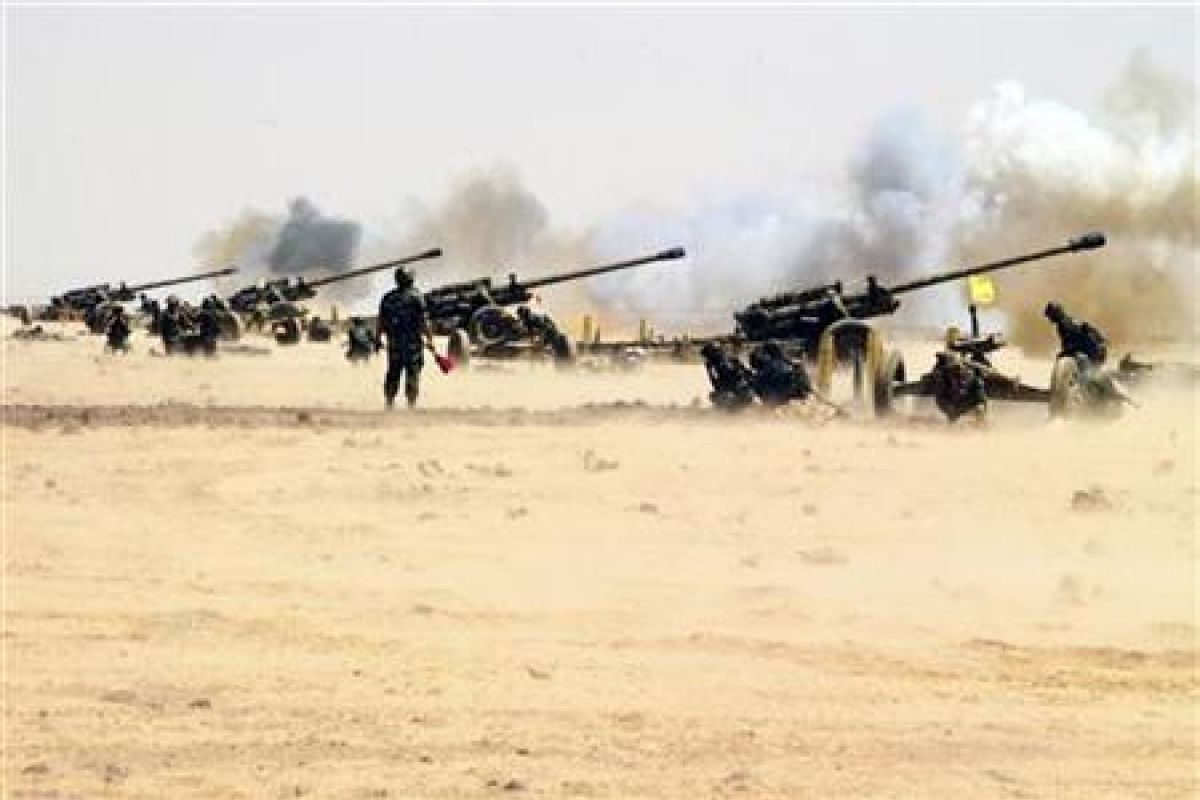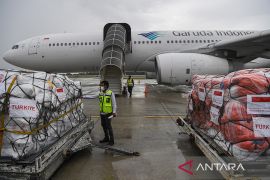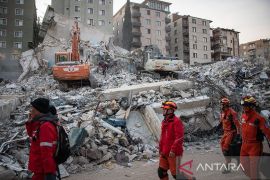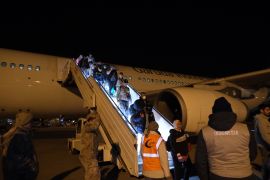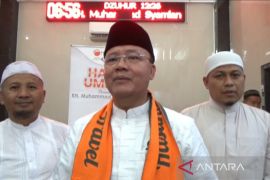Sweida, Syria, 9ANTARA News) - Nashat Abu Ammar, 40 years old, received an urgent call from his terrified wife before daybreak on July 25, telling him the Islamic State (IS) militants were at the front door trying to break in their house.
The man was just having a night shift at a hospital in a nearby town outside his village of Shbeki in the eastern countryside of Sweida province in southern Syria.
Shocked by the call, he rushed to coworkers, fumbling for anyone with a car to provide a ride back home to try to defend his wife, his 75-year-old mother, and three children, the oldest of whom is an 11-year-old boy.
Upon reaching the outskirts of the village and trying to make his way home, the man received a gunshot at his back by one of the IS militants who were sealing off Shbeki.
His friends were quick to rush him to the hospital but his wife kept calling him, asking why he hadn`t shown up as the attackers were breaking into the house.
Ammar couldn`t tell he was shot which would make her feel much worse, but that wound in the back is tormenting him with guilt as he said would rather die defending his family than being treated at the hospital.
Later on, the man learned that his families were taken hostage by the IS militants, which attacked Shbeki and four other towns in the eastern countryside of Sweida before dawn on July 25, of which the first massive attack was coupled with suicide bombings inside Sweida, leaving over 260 people killed during the whole attack.
The man was then told that his old mother couldn`t make it on foot and she was shot dead in the eastern part of the village by her captors.
"My mother was 75-year-old with a heart condition and was ... shot dead," he recounted, with tearing eyes and a cracking voice
In Shbeki, a small village of 200 residents, most of the people there are relatives. When the militants attacked, they snatched the people from the homes whose men were either out for night jobs or out of the country.
The attackers got the information of these houses from the Bedouins who used to frequent the village.
Other men confronted the attackers as most of them held up rifles and started defending themselves.
Jawdat Abu Ammar, Nashat Abu Ammar`s cousin, was in Saudi Arabia along with his two brothers when the attack took place. After knowing their women and children were taken, they returned to Shbeki three days later.
Unable to enter their homes due to all of the emotions, they decided to wait for their families to be set free and enter their homes together.
"I felt agony as I wasn`t here to defend my family. This feeling is like a big deep wound, but we have a strong faith in our army, our president and we believe that our kidnapped families will return safely," he told Xinhua.
He also took up a rifle and wore the traditional attire of the Sweida people, a white skullcap black baggy trousers and shirt, along with his brothers as they started patrolling the town just in case of any sudden attack by IS.
"We are all ready to sacrifice for our country. All we can say is that the women and children should return," he said.
The IS militants kidnapped over 30 people when they retreated as a result of the local resistance and the army backup, during which 60 people were killed in the village.
The militants later negotiated the lives of the hostages in exchange for the Syrian army to allow the besieged IS militants in the nearby province of Daraa to leave.
The army later captured Daraa and closed in on the IS in the Tulol al-Safa hills in the remote eastern countryside of Sweida.
The 19-year old Muhannad Abu Ammar was killed by IS, marking the first hostage to be slain. Later on, a woman was said to have died from her tough medical condition.
The father of Muhannad told Xinhua that he had suffered from two shocks: the first was the IS attack and the second is when he received a video showing his son being killed.
"They wanted to kill everything as that calls for knowledge in this country," he said.
Ghazi Abu Ammar, one of the senior members of the Abu Ammar family, said the people of the Shbeki village were peaceful and have never imagined that their village would be attacked by IS.
"The people of this village are peaceful and most of them work in farming and we haven`t anticipated such an attack and truly such a surprise attack have cost us many martyrs," he said.
The man in his 60s recounted what happened that day, saying that the IS militants attacked Shbeki in large numbers and entered the village from four directions at 3:50 a.m. local time on July 25 while people were asleep.
The IS militants snuck into the village and took positions on rooftops. They sent two fighters to each house and started firing, shooting sleeping people dead in cold blood, he said.
"They kidnapped women and children in cooperation with Bedouins who were in the village. They called people by name because they were tipped off," he revealed.
They shot at the houses whose residents refused to open and broke the locks and took women and children to the Guidance Unit in the village before hustling them to the eastern part of the village.
"We didn`t know when they got out of the village with the hostages," he said.
Ghazi said at the time of the attack, only 15 residents of the village could fight back.
"When we heard the gunshots, those who have rifles and guns and others who have hunting rifles fought the attackers."
The only place that couldn`t be entered by the IS attackers in the village is a place where people had machine guns and Kalashnikov rifles.
"We received aid from many places in Sweida and Syria and we managed to withstand the attack for two hours before we received help from outside," he recounted.
Four IS commanders were killed by the locals in the village and their bodies were retrieved by the withdrawing IS militants, who stole cars in the village and left.
"Those militants entered the village with the aim to kill and terrorize people ... this is the nature of IS as they enter any area to terrorize people and kill," Ghazi stressed. "This is terrorism."
Shbeki is now almost empty of women as the men sent them after the IS attack to the capital city of Sweida for safety.
The men of the village along with other volunteers are now patrolling the village and their land in anticipation to another IS attack, even though the militants of the terror-designated group were pushed way back and are now besieged by the army.
The families of the kidnapped people called on the international community and humanitarian organizations to help in securing the release of their families from the grip of IS.
Activists said that negotiations between the Syrian side and the IS under a Russian mediation haven`t yet resulted in the release of the kidnapped people.
But the men of Shbeki said they have faith in the Syrian leadership to secure the release of their families.
Those men seemed to be strong but whenever they recall their women and children, they get tears and refuse to enter homes, showing visitors the bullet holes and the leftovers of the IS attack on their homes.
Reporter: Antara
Editor: Chaidar Abdullah
Copyright © ANTARA 2018
